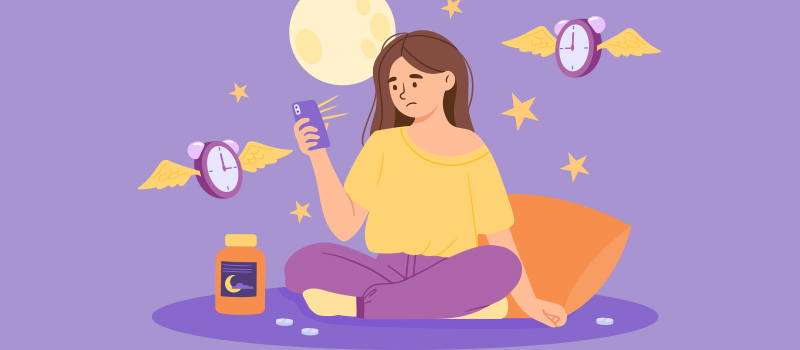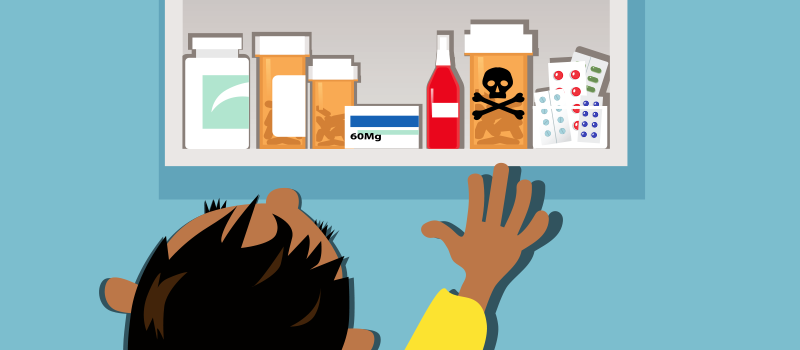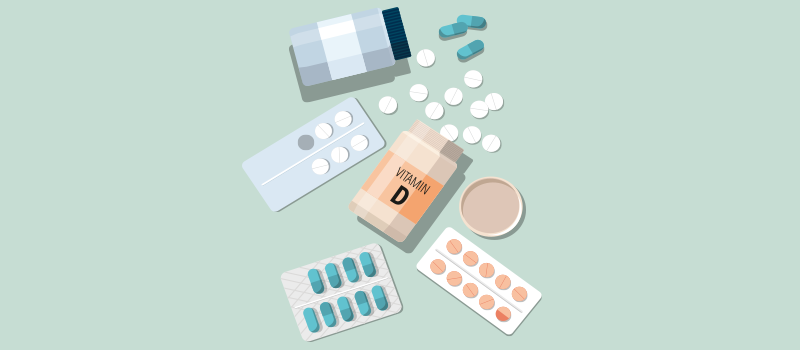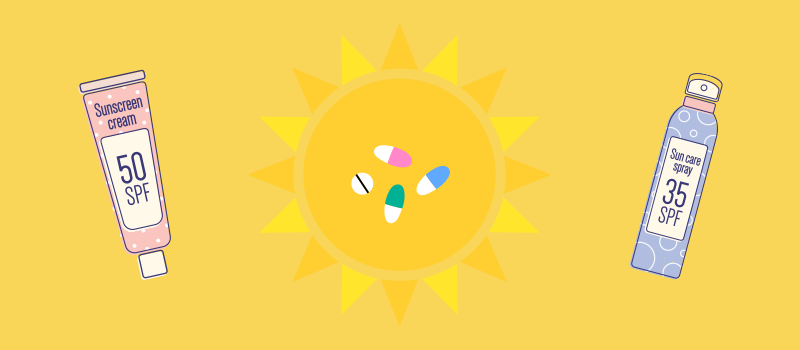What’s the Buzz
The Bee Healthy Blog
5 Signs of a Melatonin Overdose

Melatonin is a naturally occurring hormone produced by the brain’s pineal gland. It is called the sleep hormone because it plays an important role in promoting sleep and regulating the body’s circadian rhythm (sleep-wake cycle). Synthetic melatonin is a dietary supplement and is used as a sleep aid. While melatonin consumption is considered relatively safe with few side effects in healthy adults, too much melatonin can be harmful. Please continue reading to find out the symptoms and signs of an overdose of melatonin.
What are the advantages of taking melatonin?
Taking melatonin has been found to reduce sleep latency (time taken to fall asleep) by an average of 7 minutes. Melatonin also increases sleep duration (how long you stay asleep) by an average of 8 minutes. In addition, melatonin supplements have been found to improve the quality of sleep and make the sleep cycle more regular.
Melatonin is used to treat insomnia, regularize the sleep schedule in people with jet lag, and treat sleep disorders in which circadian rhythms are disrupted, such as shift work sleep disorder. It is one of the most commonly used sleep aids and is recommended as a first-line treatment for insomnia.
One of the key advantages of melatonin is that it is not habit-forming, unlike some of the other treatments for insomnia. Therefore, melatonin can be an effective complementary and integrative health approach to treat insomnia.
What are the disadvantages of taking melatonin?
Melatonin is a dietary supplement, and it is not regulated by the U.S. Food and Drug Administration (FDA). There are currently no FDA-approved uses for supplemental melatonin. As a result, you cannot be sure if a melatonin supplement contains the actual concentration mentioned on the supplement labels. The bioavailability of supplemental melatonin is also highly variable and depends on the formulation and the dose. Studies have found that melatonin content in supplements can range from 83% less to nearly 478% more than the content mentioned on the label. Also, the melatonin content in supplements made by the same manufacturer can vary as much as 465% from lot to lot. Moreover, studies showed that some melatonin supplements contain serotonin, a controlled substance used to treat neurological disorders.
How much melatonin should you take?
The FDA does not regulate melatonin supplements, and there is no well-defined dosage. The usual doses of melatonin range from 0.1 mg to 10 mg, taken approximately 2 hours before bedtime.
It is best to start at the lowest dose and gradually increase the dose if you don’t sleep well on low doses. Check the package label, and do not take more than the maximum labeled dose.
Melatonin supplementation is available in the form of oral tablets, oral liquid, transdermal patches, and rectal suppositories. It comes in immediate-release, extended-release, and mixed immediate and extended-release formulations.
Is it OK to take 20 mg of melatonin?
It is best to avoid taking 20 mg of melatonin. As mentioned, there is no well-defined proper dosage of melatonin. Generally speaking, a melatonin dose of 3 mg to 5 mg before bedtime is considered a safe dose. Higher doses above 10 mg may be unsafe. If melatonin does not help with your insomnia after a few days, talk to your healthcare professional before taking more melatonin.
Can I take 2 melatonin 10?
You should avoid taking 2 melatonin 10 together. If you continue to experience sleep problems even after taking the recommended dose of melatonin, talk to your healthcare provider. They may refer you to a sleep specialist (expert in clinical sleep medicine) to find out the underlying cause of your sleep disorder and treat it appropriately.
Is melatonin safe for children?
According to the American Academy of Family Physicians (AAFP), pediatric melatonin ingestions are safe and can be used to improve sleep in healthy children. The recommended dose is 0.3 mg to 5 mg of melatonin supplementation, taken 1.5 to 6.5 hours before bedtime for a few days. Taking melatonin later in the night can delay sleep onset.
Melatonin is particularly helpful in treating insomnia in children with neurodevelopmental disorders such as attention deficit hyperactivity disorder and autism in conjunction with behavioral modifications.
Be sure to check with your child’s healthcare provider before giving melatonin.
What are the side effects of taking melatonin in supplement form?
Common side effects of melatonin supplements include drowsiness, dizziness, nausea, headache, and daytime sleepiness. Less common side effects include short-term depression, mild anxiety, irritability, tremors, stomach cramps, reduced alertness, disorientation, and confusion.
What happens if you take too much melatonin?
Taking too much melatonin varies per person and has been shown to result in an acute melatonin overdose with signs and symptoms including:
-
Headache
-
Rash
-
Gastritis (stomach inflammation)
-
Insomnia
Long-term sleep-related melatonin use may affect reproductive hormones and result in a reduction in semen quality in otherwise healthy men.
It is worth noting that studies on the central nervous systems of animals have shown that melatonin poisoning with up to 800 mg/kg is not fatal.
Can you recover from a melatonin overdose?
Yes, you can recover from a melatonin overdose. You should stop taking melatonin supplementation immediately to rid your body of excess hormones and relieve the symptoms caused by a melatonin overdose.
The good news is that melatonin does not last long in your body. Melatonin has a half-life of 20 and 50 minutes. The half-life is the time that the body takes to remove half of the initial drug amount from the body. Typically, it takes between 4 and 5 half-life for a drug to be completely eliminated, so melatonin is generally removed from the body after 4 to 5 hours. However, keep in mind that the time it takes for the body to remove any medication will depend on a person's age, sex, and medical history.
In summary, if you realize that you’ve taken more than the recommended dose of melatonin, stop taking melatonin immediately. If you take melatonin routinely, it is best to stop taking this supplement for a while. If the symptoms are severe, seek emergency medical care immediately. If you still need to use a sleep aid, talk to your doctor to discuss the best option for you.
Who should not take melatonin supplements?
Women who are pregnant or breastfeeding should avoid taking melatonin supplements because their safety has not been studied in these populations.
People who have health conditions such as impaired renal function (kidney disease), impaired hepatic function (liver disease), or an autoimmune disorder such as rheumatoid arthritis should check with their healthcare provider before starting melatonin.
An allergic reaction to melatonin is rare. Seek medical attention in the emergency room if you begin experiencing symptoms and signs such as a skin rash, hives, itching, swelling, chest pain, or trouble breathing after taking melatonin.
If you are on other medications, check with your healthcare provider before starting melatonin. Drug interactions could lead to serious adverse effects. Melatonin may interact with the following:
-
Sedatives and tranquilizers (increased risk of an additive sedative effect and excessive sleepiness)
-
Blood pressure medications that are used to lower blood pressure in people with high blood pressure
-
Anticoagulants (blood thinners)
-
Antiepileptic drugs
-
Contraceptives
-
Certain antidepressants, such as fluvoxamine (Luvox)
-
Immunosuppressants
References:












SOCIAL